Arab League signed in Cairo, March 22
Kings and heads of states of 22 Arab League nations participated and held discussion to improve human rights, including those of Christians, by amending the 1994 Arab Charter on Human Rights at a summit in Tunisia. It will specifically affirm every individual's right to life; the right to fair trial; the legal status of crime and punishment; the right to political asylum without extradition; and prohibitions on torture, deportation and revoking citizenship.
The League played a key role to promote economic development, settle disputes between Arab countries, and coordinate political aims. It was established to unite Arab countries in their handling of a number of crucial crises.
Egypt is one of the most influential country's within the Arab League, and any changes there are believed to impact the whole region.
The League's headquarters were moved from Cairo, Egypt, to the Tunisian capital of Tunis after the signing of the Egypt—Israel peace treaty in March 1979. Egypt's membership of the Arab League was suspended because of the conflicts over policy with Israel intensified.
Ten years later Egypt's membership was reinstated and the headquarters were moved back to Cairo in 1990.
The March 29-30 summit was expected to be also closely monitored by Christian human rights watchdogs, including the influential U.S. Copts Association, which has expressed especially concern about the persecution of Coptic.
The U.S, Copts Association is also concerned about the vulnerable Coptic young women who have repeatedly threatened by the Muslim extremists who intent to convert them to Islam.













